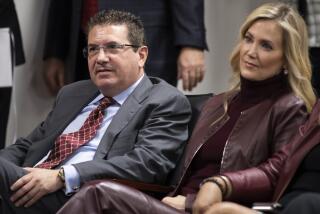Sosnoff Says Caesars Tried to Buy Him Out : Suitor’s Filing With SEC Details Behind-the-Scenes Battle With Firm
- Share via
Martin T. Sosnoff, who on Monday offered to buy all of Caesars World’s publicly traded shares that he doesn’t already own, disclosed Wednesday that Chairman Henry Gluck and other management representatives proposed buying him out of his major stock holding several times in the last year.
The New York money manager, in an amended Securities and Exchange Commission filing, said he did not accept any of the proposals, or another for a “standstill” agreement. That proposal would limit his ability to acquire additional shares or take any action adverse to Caesars’ management, the filing said.
A Sosnoff spokesman said the reported contacts with Caesars were made six months ago. The company has not offered to buy Sosnoff’s 13.6% interest since then, the spokesman added.
Another amendment provides that Paine Webber, Sosnoff’s underwriter, would be entitled to a special fee in the event that Sosnoff does not complete his offer and sells any of the Caesars shares he currently owns by next Dec. 1.
The fee would be 10% of any excess of the sales price above $20 a share. Such a fee also would be payable in event of “any transaction following the announcement of a competing bid for or leveraged buyout of the company.” The filings disclose elsewhere that Paine Webber has already earned $1 million in regular fees and will get earn another $4 million if Sosnoff acquires control of Caesars.
The amended filing also reported that Sosnoff has sued Caesars World and its board in a federal court in Miami. The filing said the suit alleges that directors breached their fiduciary duty to stockholders through “various actions designed to discourage investor interest in the company and to entrench existing management.”
Caesars World, which has been silent since saying Monday that it would study the $28-a-share, $725-million proposal with legal and financial advisers, declined to comment Wednesday on Sosnoff’s new disclosure material.
The company’s stock was the biggest volume trader on the New York Stock Exchange on Wednesday, closing at $27.75 a share, dropping from Tuesday’s new high of $28.50.
Gluck, 58, has not indicated publicly his reaction to the Sosnoff move, which could oust him after four years at the helm of the Los Angeles-based operator of hotel-casinos in Nevada and New Jersey.
Sosnoff, 55, has been the largest Caesars stockholder almost since Gluck was elected chairman by his fellow directors, who together own only 1.5% of the company’s 30 million shares outstanding. Sosnoff passed the 5% mark two years ago and exceeded 10% in August, 1985. The company said in its proxy material for its annual meeting last Dec. 9 that it knows of no other individual holders of as much as 5%.
Among other things, Sosnoff’s public filings this week estimated that Gluck would be entitled to receive $2 million under a provision in event of change control of Caesars, under his new five-year contract. The filings also document a furor over Gluck’s failure at the December annual meeting to present Sosnoff’s stockholder proposal for a vote, although the proposal was set out in the proxy statement.
Sosnoff, who has asked in vain for membership on the Caesars board, submitted a shareholders resolution recommending that the board refrain from adopting “anti-takeover” charter amendments.
Shortly after the meeting, the filing shows, Sosnoff sent a Mailgram telling Gluck that he was “deeply distressed by your cavalier actions in withholding my proposal from shareholder consideration” at the meeting.
“Your lawyers no doubt advised you that not putting the proposal to a shareholder vote would be a clever ploy,” the message went on.
Calling the conduct “a blatant attempt to disenfranchise shareholders who thought they had voted on my proposal,” Sosnoff said his lawyers had taken up the legality of the omission with Caesars’ counsel.
The filing contains a written response from Gluck, which said in part:
“When, much to my surprise, neither you nor a representative were present at the meeting and nobody moved your proposition, I turned to (corporate counsel) Phil Ball for his legal opinion. His advice was simply to ‘move on.’ There was no ‘clever ploy’ involved.”
In reporting the lawsuit in Florida, where Caesars is incorporated, the filings say Sosnoff is complaining that actions to discourage investor interest and entrench management included issuance of $115 million of convertible debentures.
Under certain circumstances, it said, the debentures “may be converted at a reduced conversion price, thereby causing the company to be a less attractive acquisition candidate and thus reducing stockholder values.”
Other actions cited in the complaint include Caesars’ “adoption of inequitable by-law provisions which . . . unfairly restrict the election or removal of directors by written consent of the stockholders” and which, it said, violate Florida law.
More to Read
Inside the business of entertainment
The Wide Shot brings you news, analysis and insights on everything from streaming wars to production — and what it all means for the future.
You may occasionally receive promotional content from the Los Angeles Times.










